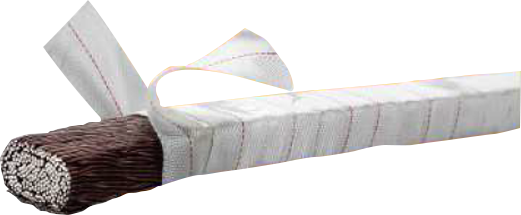- 9168643114
- info@rationalengineers.com
- ISO 9001:2015
Pressed Litz Wires
Pressed Litz Wires
Pressed litz wire allow optimal utilization of available winding area due to the superior filling factor. In comparison to a standard round cross section construction, profiled litz wire can increase the filling factor by up to 20%.
Types of Pressed Litz Wire
- Round Litz Wires
- Rectangular Litz Wire
- Square Litz Wire
W.R.T Frequency Range
| Frequency | Individual Strand Diameter |
| 1.5 MHz-2.8 MHz | 0.032 mm |
| 850 kHz-1.5 MHz | 0.040 mm |
| 500 kHz-850 kHz | 0.050 mm |
| 250 kHz-500 kHz | 0.063 mm |
| 100 kHz-250 kHz | 0.071 mm |
| 50 kHz-100 kHz | 0.100 mm |
| 20 kHz-50 kHz | 0.125 mm |
| 10 kHz – 20 kHz | 0.200 mm |
| 1 kHz-10 kHz | 0.250 mm |
| 50 Hz-1 Hz | 0.250 mm |
W.R.T Product Range
| Specification | Range |
| Cross-sectional Area | 0.1 MM2-400 MM2 |
| Diameter of single strand | 0.04 MM-2.52 MM |
| Type of Lay | CONCENTRIC/NON-CONCENTRIC |
| Direction of lay | S/Z |
| Width of litz | Up to 25 mm |
| Thickness of Litz | Up to 20 mm |
Type Of Insulation
| Insulation Type | Temperature Class | Features |
| Polyimide – imide | 220°C | – Better thermal properties. |
| Polyimide-imide modified | 180°C | – Good electrical properties. |
| Polyester-imide modified + Polyimide – imide |
200°C | – High temperature/Better dielectric values/ Better moisture resistance. |
| Polyimide | 240°C | – Better flexibility/Better chemical compatibility/ High dielectric values. |
| Polyurethane modified | 155 to 180 | – Solderable/Good flexibility/ Better moisture resistance. |
| Cotton | 105°C | – Low cost/Good abrasion resistance. |
| Cellulosic Papers (Kraft paper/Crepe Paper) | 120°C | – Better electrical values / Better bending values for crepe paper. |
| Polyester (PET) | 130°C | High dielectric strength / Good abrasion resistance |
| Nomex | 200°C (Up to 220°C under certain conditions | – High inherent dielectric strength/Mechanical toughness / Thermal stability |
| Polyimide Kapton® | 240°C (Up to 400°C under certain conditions |
– high performance / Heat resistant/ Good adhesion properties /Low outgassing under vacuum. |
| Fiber Glass | Temperature class will depends on the Application and type of Glass |
– Excellent electrical properties at high temperature / Excellent solvent resistance |
| Mica | Temperature class will depend on the Application | Highly flexible and easy to wind, which provides good adhesion with coils excellent electrical insulation properties including corona resistance/Excellent heat resistance, which also allows for use in high heat resistance classification |
| Silicon (Exclusion) | 220°C | – Highly flexible and easy to bend, excellent for indoor and outdoor application. Provides good resistance to oil, grease, water etc. Excellent heat resistance, which also allows for use in high speed and high frequency application. |



